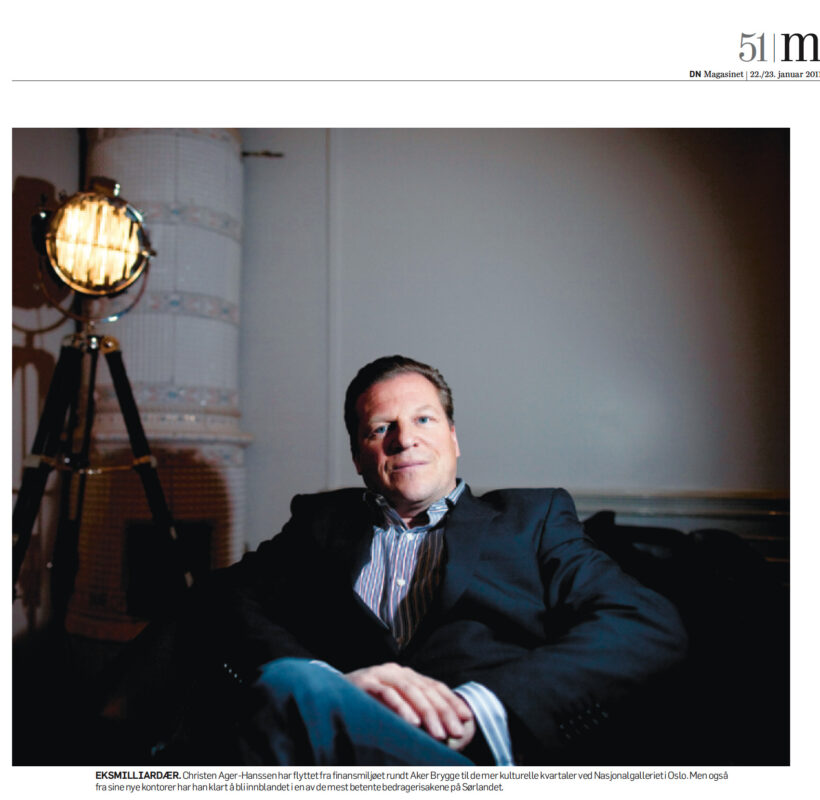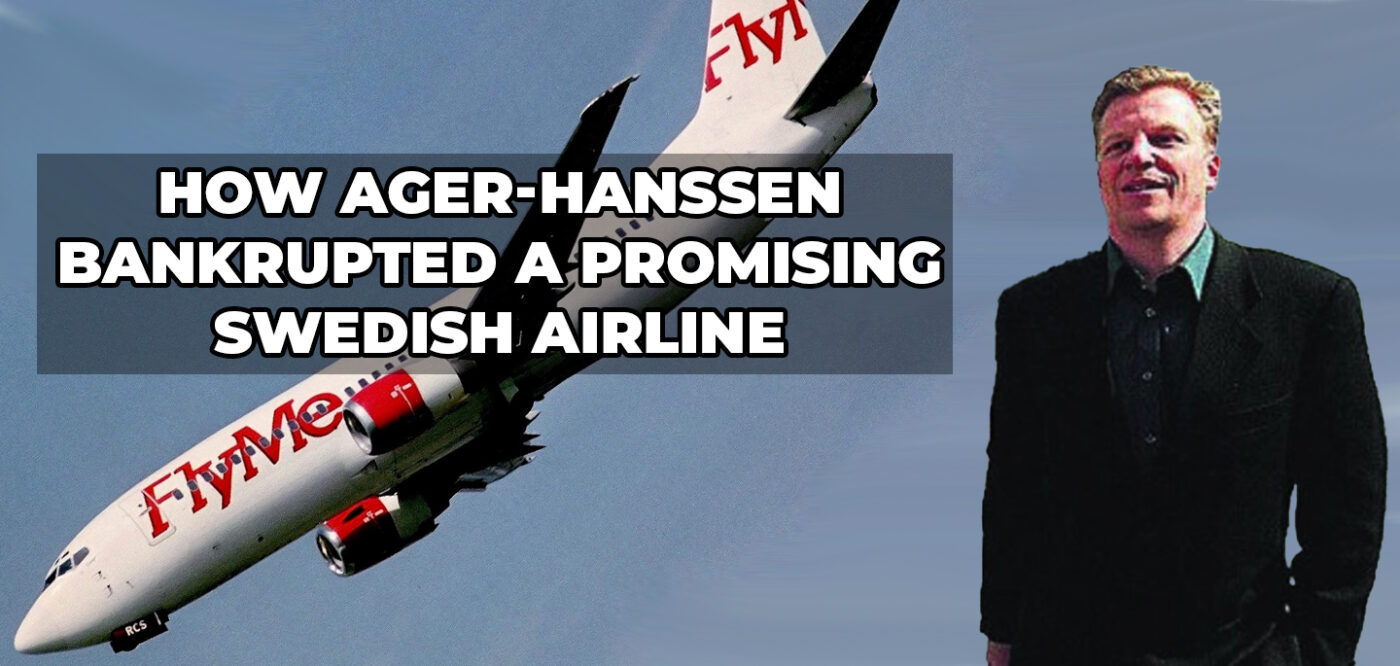When Ager-Hanssen bankrupted yet another company, FlyMe, the writing had been on the wall from the beginning. As journalist Torbjörn Isacson put it: “Ager-Hanssen had a bad reputation on the Swedish financial market right from the start”. By this stage, despite claims about his net worth, he was bankrupted by the Swedish state after lying to them about being domiciled overseas. Yet, somehow, he was able to find a mark to convince to hand over their money for him to fritter away in the same way he always does, by lying, bullying and eventually bankrupting the firm.
That mark, was the late John Porter, the (actual) wealthy grandson of the founder of the British supermarket Tesco. Ager-Hanssen convinced porter to buy a controlling stake in the Swedish airline, FlyMe.
Shortly after taking control of the company, FlyMe issued a press release stating they had agreed to purchase a 50% stake in Porter’s company River don LTD, which in turn owned an air cargo transportation company, Global Supply Systems Ltd.
If that didn’t raise eyebrows, their next move certainly did. FlyMe decided to carry out a new issue of shares worth SEK 194 million, with Cognition guaranteeing SEK 130 million themselves. The prospectus stated “The guarantees are not secured by, for example, bank guarantees, pledges, cash or other means” – leading some to question whether or not Cognition had enough assets for such a guarantee.
Anne-Marie Pouteaux, the lawyer who was handling Ager-Hanssen’s personal bankruptcy, told journalists at the time: “The question is whether the guaranteed SEK 130 million really exists. The shares in Fly Me are owned by Cognition A/S, but according to Ager-Hanssen, Cognition is not owned by him but by his partner.”
Ager-Hanssen’s role in FlyMe had been a controversial topic from the start, as he was bankrupted in 2004 by the Swedish government over SEK 20 million in unpaid taxes, which he tried to claim non dom status for, telling them he was living in London, despite being found to have been in Sweden the entire period.
The FlyMe saga led Porteaux to re-examine if there were assets she could seize to satisfy the debt. “I have started a number of recovery processes to get certain transactions back to the bankruptcy estate, because he himself has no assets.” she told Swedish journalists.
The question was also raised at the time of the financial situation at Cognition, as the company had pulled out of a deal between its subsidiary company Nordic Oil [of which Björn Olegård was also CEO] and petrol company Bilisten. According to reports at the time, Cognition missed the end of August deadline for payment, which led to the deal collapsing. FlyMe, was also haemorrhaging money.
On the 6th December 2006 the Swedish tabloid Aftonbladet published an article asking “Dare we book with Flyme?” after a number of executives quit following sustained losses.
CFO Finn Taulow was quoted in the article as saying: “Yes, absolutely, we have full control over our financial inflow and enter 2007 with 17,000 new shareholders and there are many who book with us, so you don’t have to worry about that.”
The company’s CEO, Björn Olegård, whom had been appointed the pervious summer at the behest of Ager-Hanssen and Fedeli, sent out a press release on stating the company had registered a new share capital of SEK 179 million with the Swedish Companies Registration Office, although all of the money was not yet there.
This led to a behind the scenes war between Cognition and the other shareholders, who were growing weary of the fact Cognition was less than two months away from the deadline and at least SEK 33 million short, due on the 28th February, the same day the board was meeting to approve the end of year report.
When the 28th came, the money was nowhere to be seen, nor was the report the other investors had told would be ready by the morning. According to one investor, it still had not arrived by 5pm. One told Swedish news: “It is completely unacceptable that we have to make such a gigantic decision in a company that has very large liquidity concerns where the new issue is said to be fully subscribed, but where significant parts of the issue have not been paid in and you cannot tell when the money will arrive. It is hoped that they will arrive today, but this is not known.”
Ager-Hanssen had told them he expected the company to be in profit by the spring of 2008, but this did not reassure investors. “We don’t know if this company will even be alive in a few weeks,” one said at the time.
The other shareholders refused to approve the accounts and annual report, throwing the company into chaos. They also refused to sign off on the purchase of River Don, telling Ager-Hanssen he could only afford 25% and could buy the remaining 25% in December, “because you don’t have money” one shareholder is quoted as saying at the time.
Less than 72 hours later, they announced they were putting the company into bankruptcy.
The company’s recently appointed Chairman of the Board, Thommy Nillsson, whom had only been in the job several weeks, told reporters at the time the bankruptcy was solely the doing of Christen Ager-Hanssen and Cognition.
“I think this is extremely tragic. It is very sad that we did not receive the guarantee that we received from Cognition. If we had received that guarantee, we would have been able to close the issue and then we would not have had to do what we did”, he said at the time.
He was also critical of Ager-Hanssen stooge Staffan Edh, who was both a board member of FlyMe and another failed Ager-Hanssen venture, Ticket, claiming he had previously been his lawyer and therefore was shocked he had lied to him about the state of the business. “I have worked for a long time with Staffan Edh and have great trust in him. He has been our business lawyer both at JC and KappAhl. It was from that side that I was asked the question. I was told that the
issue was not a problem and that the budgets looked good.”
Swedish reporter Torbjörn Isacson also hit out at Ager-Hanssen and his minions, writing at the time:”The provision of information belongs to the absolute bottom among listed companies, with incorrect and contradictory information from a management and a board that ultimately chose to go completely underground. It would be a mystery if the current chairman Björn Olegård would get a similar assignment in a listed company again.
Ager Hanssen had a bad reputation on the Swedish financial market right from the start.
Torbjörn Isacson
An even bigger mystery would be if any investor would put money into a company where the Norwegian financier Christen Ager Hanssen has any influence whatsoever. Ager Hanssen had a bad reputation on the Swedish financial market right from the start.”
On the 22 May 2007, the company agreed a settlement with Cognition, in which “the parties waive all claims against each other and must cooperate for FlyMe Europe AB’s and all shareholders’ best interests.” Which led some people to speculate if Ager-Hanssen had kompromat on board members.
The bankruptcy led to an investigation by the Swedish economic crimes unit, who probed whether or not the share money had been illegally used to purchase River Don. Within weeks of the bankruptcy filing, police raided Staffan Edh’s law firm. According to thelocal.se: “One of the reasons for the raid was a client account not included in Fly Me’s accounts, which was controlled by Edh and Chairman of the Board, Björn Olegård.No other board members had access to the account at the law firm.”
Ager-Hanssen, Björn Olegård, Staffan Edh and Finn Thaulow were all charged in relation to the bankruptcy.
The prosecutor claimed the cabal “abused their position of trust in FlyMe Europe AB by working for/concluding agreements on the purchase of shares in River Don Ltd.”
“Edh, Olegård and Thaulow have subsequently together and in consultation with other representatives of the company during the autumn and winter of 2006 up to and including the general meeting on 28 February 2007 continued to abuse their position of trust by, despite the fact that it was possible according to the above-mentioned agreement and despite it has been beneficial for the company, not letting the purchase price go back. They have also acted so that the general meeting.

“Furthermore, Christen Ager-Hanssen, as a representative of the main owner of FlyMe Europe AB, has, to the detriment of the company, abused his position of trust by approving the aforementioned payment and the agreement on which the payment was based at the general meeting on February 28, 2007, without there being any commercial basis for the transactions/agreements and without the company having received the corresponding assets or satisfactory security provided for the transactions.”
“The act has caused damage to the company. The act is to be regarded as serious in view of the size of the amount and as the business events have not been properly reported in the company’s accounting.”
During the trial, the prosecutor stated: “the men, if they are not to be regarded as individual perpetrators, helped to bring the deal to fruition, that is to say that they participated in the crime together.”
For their role in enabling Ager-Hanssen’s fraudulent transactions, both Olegård and Edh spent six months in prison after the prosecutor appealed the original acquittal. As usual, Ager-Hanssen got away with it, blaming others for his failure.
Olegård’s reputation was absolutely destroyed by Ager-Hanssen, and he could never find another job after leaving prison. He now works for Ager-Hanssen at his company, Custos Group, which seemingly only runs spammy marketing apps.
A more conspiratorial-minded person may wonder just why the prosecutor did not seek to appeal Ager-Hanssens’ acquittal. More to follow…
If you have found this article useful, please share it on social media:

